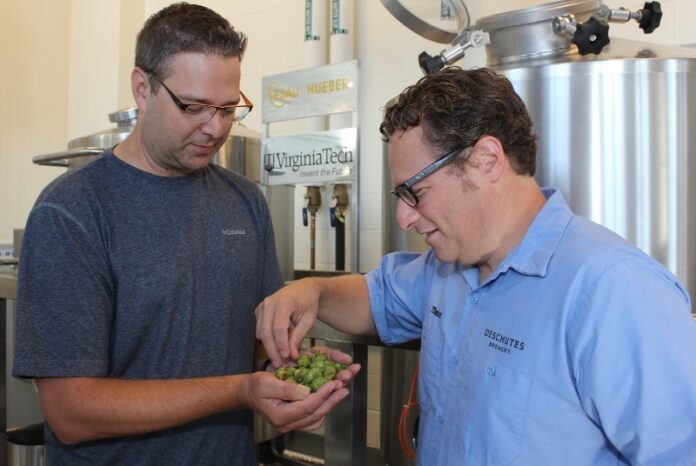
Deschutes Brewery wasn’t the only one making its first big public appearance in the region when the brewery hosted a Street Pub in downtown Roanoke Saturday, August 28th.
The faculty, staff, and students who are part of the Virginia Tech Brewhouse were also at the event, showing off some of the science of fermentation that goes into making good beer and talking about how the facility is helping the craft beer industry that is experiencing meteoric growth.
Ever since the brewhouse opened earlier this year, it has been a hub of innovation and education, with local and national brewers partnering with the university to find ways to grow their business and test their products. Meanwhile, students are hopped up on learning about the growing fermentation industry.
The brewhouse, which is housed in the Department of Food Science and Technology pilot plant, is not open to the public, so the Saturday event was a perfect opportunity to educate the community on the research, outreach, and education going on in the College of Agriculture and Life Sciences.
“We are really excited to share information about the work we are doing to promote the craft beer industry and the science behind it,” said Brian Wiersema, the manager of the pilot plant. “And we [were] doubly excited to do this at an event that Deschutes is putting on since we have developed a great working relationship with them in recent months.”
Shortly after Deschutes made its much-anticipated announcement in March that the Bend, Oregon based brewer was opening a location in Roanoke, the Tech brewhouse began establishing a relationship and working with the company to do profile matching and process and flavor testing. They department is working on setting up a student internship program and further research with the company.
Similar collaborations with brewers both big and small are happening on a regular basis. It is one way in which the university is helping the commonwealth’s beer industry, which has a more than $8 billion annual economic impact and generates $2.9 billion in annual tax revenues, according to the Beer Institute.
Others in the college are looking at the best types of barley and hops for farmers in the region.
Holly Scoggins, an associate professor in the Department of Horticulture, is trialling eighteen cultivars of hops, a key ingredient in beer, to help determine which perform best in Virginia. Once the hops are harvested, Scoggins and her collaborators take them to the Food Science and Technology analysis lab for acid profiles and the pilot plant where they are dried. Her work is funded by the Virginia Agricultural Council and Virginia Department of Agriculture and Consumer Services.
In the future, Virginia Cooperative Extension agents can work with producers to grow the ingredients for beer in the state. Research is conducted through the Virginia Agricultural Experiment Station.
During the Deschutes event students and faculty from the Department of Food Science and Technology demonstrated the chemistry behind off-flavors of fermentation, complete with samples of smells that can result from poor brewing processes and practices.


